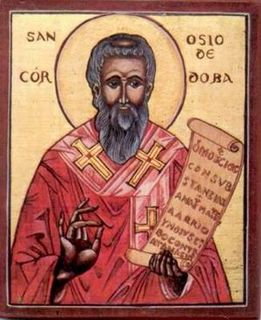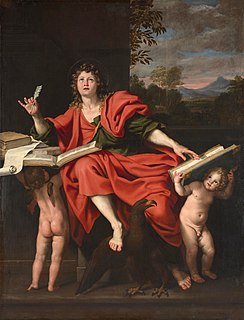Related Research Articles

The Council of Chalcedon was the fourth ecumenical council of the Christian church, convoked by Emperor Marcian. The council operated in Chalcedon, Bithynia from 8 October to 1 November, 451 and was attended by 520 bishops or their representatives. The gathering itself continues to represent the largest and best-documented of early councils. The principal purpose of the Council was to re-assert the doctrine of Council of Ephesus against the heresy derivative of Eutyches and Nestorius. Such heresies attempted to dismantle and separate Christ's divine nature from his humanity (Nestorianism) and further, to limit Christ as solely divine in nature (Monophysitism). As recorded by American Christian Scholar Jaroslav Pelikan, it was stated:
We all teach harmoniously [that he is] the same perfect in godhead, the same perfect in manhood, truly God and truly man, the same of a reasonable soul and body; homoousios with the Father in godhead, and the same homoousios with us in manhood ... acknowledged in two natures without confusion, without change, without division, without separation.

The deuterocanonical books are books and passages considered by the Catholic Church, the Eastern Orthodox Church, the Oriental Orthodox Churches and the Assyrian Church of the East to be canonical books of the Old Testament, but that Protestant denominations do not regard as part of the biblical canon. They date from 300 BC–AD 100, mostly from 200 BC–AD 70, before the definite separation of the Christian church from Judaism. While the New Testament never directly quotes from or names these books, the apostles most frequently used and quoted the Septuagint, which includes them. Some say there is a correspondence of thought, and others see texts from these books being paraphrased, referred or alluded to many times in the New Testament, particularly in the Pauline epistles, depending in large measure on what is counted as a reference.

An ecumenical council is a meeting of bishops and other leaders to consider and rule on questions of Christian doctrine, administration, discipline, and other matters in which those entitled to vote are convoked from the whole world (oikoumene) and which secures the approbation of the whole Church.

Irenaeus was a Greek bishop noted for his role in guiding and expanding Christian communities in what is now the south of France and, more widely, for the development of Christian theology by combating heresy and defining orthodoxy. Originating from Smyrna, he had seen and heard the preaching of Polycarp, the last known living connection with the Apostles, who in turn was said to have heard John the Evangelist.

Pope Callixtus II or Callistus II, born Guy of Burgundy, was head of the Catholic Church and ruler of the Papal States from 1 February 1119 to his death in 1124. His pontificate was shaped by the Investiture Controversy, which he was able to settle through the Concordat of Worms in 1122.
Pope Julius I was the bishop of Rome from 6 February 337 to his death on 12 April 352. He is notable for asserting the authority of the pope over the Arian Eastern bishops, as well as setting 25 December as the official birthdate of Jesus.
Pope Hilarius was the bishop of Rome from 19 November 461 to his death on 29 February 468.

A synod is a council of a church, usually convened to decide an issue of doctrine, administration or application. The word synod comes from the Greek: σύνοδος [ˈsinoðos] meaning "assembly" or "meeting" and is analogous with the Latin word concilium meaning "council". Originally, synods were meetings of bishops, and the word is still used in that sense in Catholicism, Oriental Orthodoxy and Eastern Orthodoxy. In modern usage, the word often refers to the governing body of a particular church, whether its members are meeting or not. It is also sometimes used to refer to a church that is governed by a synod.

Beatification is a recognition accorded by the Catholic Church of a deceased person's entrance into Heaven and capacity to intercede on behalf of individuals who pray in his or her name. Beati is the plural form, referring to those who have undergone the process of beatification; they possess the title of "Blessed" before their names and are often referred to in English as "a Blessed" or, plurally, "Blesseds".

Dioscorus I was the pope of Alexandria and patriarch of the See of St. Mark who was deposed by the Council of Chalcedon in 451. He was recognized as patriarch by the Coptic Church until his death. He died on the island of Gangra, Paphlagonia, in September 454. He is venerated as a saint by the Coptic and other Oriental Orthodox churches.

The Catholic Encyclopedia: An International Work of Reference on the Constitution, Doctrine, Discipline, and History of the Catholic Church is an English-language encyclopedia published in the United States and designed to serve the Catholic Church. The first volume appeared in March 1907 and the last three volumes appeared in 1912, followed by a master index volume in 1914 and later supplementary volumes. It was designed "to give its readers full and authoritative information on the entire cycle of Catholic interests, action and doctrine".

Hosius of Corduba, also known as Osius or Ossius, was a bishop of Corduba and an important and prominent advocate for Homoousion Christianity in the Arian controversy that divided the early Christianity.

John the Presbyter was an obscure figure of the early Church who is either distinguished from or identified with the Apostle John and/or John of Patmos. He appears in fragments from the church father Papias of Hierapolis as one of the author's sources and is first unequivocally distinguished from the Apostle by Eusebius of Caesarea. He is frequently proposed by some as an alternative author of some or all of the Johannine books in the New Testament.
The Councils of Carthage were church synods held during the 3rd, 4th, and 5th centuries in the city of Carthage in Africa. The most important of these are described below.

Anse is a commune in the Rhône department in eastern France.
The Synod of Rome may refer to a number of synods or councils of the Roman Catholic Church, held in Rome.

The Old Testament is the first section of the two-part Christian biblical canon; the second section is the New Testament. The Old Testament includes the books of the Hebrew Bible (Tanakh) or protocanon, and in various Christian denominations also includes deuterocanonical books. Orthodox Christians, Catholics and Protestants use different canons, which differ with respect to the texts that are included in the Old Testament.

In the liturgical traditions the Catholic Church the term ordination refers to the means by which a person is included in one of the orders of bishops, priests or deacons. The teaching of the Catholic Church on ordination, as expressed in the Code of Canon Law, the Catechism of the Catholic Church, and the apostolic letter Ordinatio sacerdotalis, is that only a Catholic male validly receives ordination, and "that the Church has no authority whatsoever to confer priestly ordination on women and that this judgment is to be definitively held by all the Church's faithful." In other words, the male priesthood is not considered by the Church a matter of policy but an unalterable requirement of God. As with priests and bishops, the church ordains only men as deacons. The church does not ordain anyone who has undergone sex reassignment surgery, and may sanction or require therapy for priests who are transsexual, contending that these are an indicator of mental instability.
The Council of Cardinals (C9), also known as the Council of Cardinal Advisers, is a group of cardinals of the Catholic Church appointed by Pope Francis to serve as his advisers. Announced on 13 April 2013, one month after his election, it was formally established on 28 September of the same year. The council currently has seven members, following the decision by Pope Francis to remove three of its members in late 2018 and the appointment of another in 2020.
References
- ↑ "Councils of Lyons". New Advent - newadvent.org/.
- ↑ "Councils of Anse". New Advent - newadvent.org/.